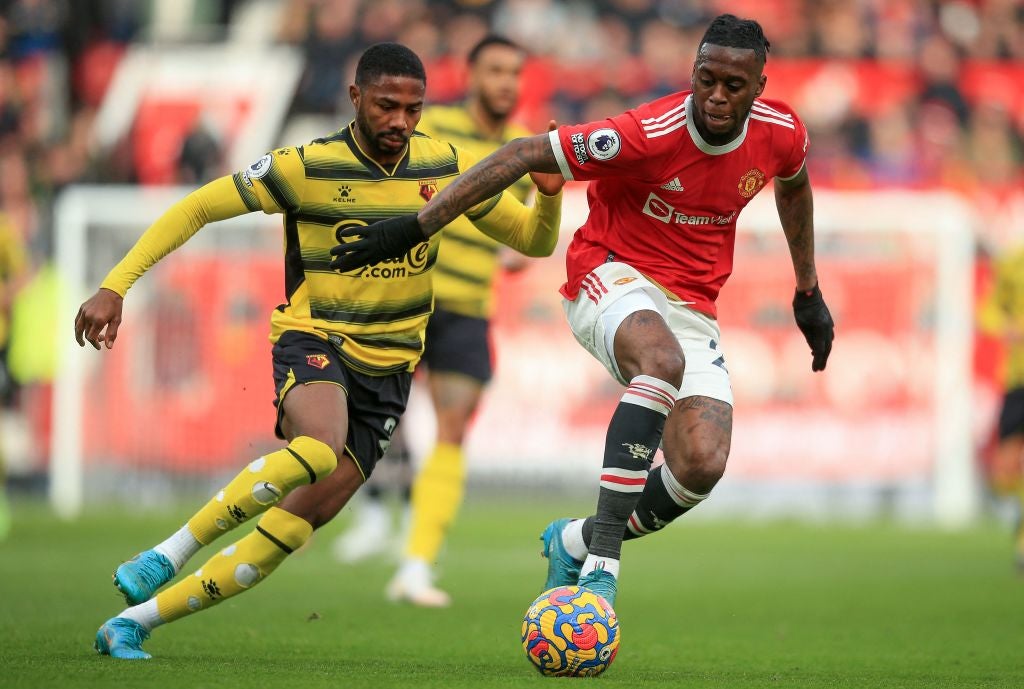
The Southgate five do not include the most expensive English right-back of all time. Gareth Southgate famously finds it hard to accommodate Trent Alexander-Arnold but at least he picked him in his Nations League squad, in a quintet of right-backs along with Kyle Walker, Kieran Trippier, Reece James and James Justin. Four of them were in his original Euro 2020 squad before the Liverpool playmaker withdrew. England can look lopsided due to the luxury of options.
If that makes everyone else at best sixth choice, the chances are that Aaron Wan-Bissaka is far from that, and not merely because Kyle Walker-Peters was called up in March. England had so few fine right-backs that Glen Johnson was the lone specialist in successive World Cup squads. Now they have so many that Matty Cash has become “the Polish Cafu” in more than just nickname. Tariq Lamptey has agreed to become the Ghanaian Cafu. The precocious, but sadly sidelined, Tino Livramento has Scottish and Portuguese heritage and, if the queue for places in the England team might alert others, he should be aware that the player branded “the Scottish Cafu” was, implausibly, Alan Hutton.
And yet Wan-Bissaka’s plight is such that he now feels distanced from talk of the England pecking order. He was briefly called up in 2019 but Southgate no longer fields questions about him; he might not even if Wan-Bissaka were to choose to represent the Democratic Republic of Congo instead.
Because many at Old Trafford had a chastening season, but few more than a £50m arrival who was designed to lock down the position for a decade. Wan-Bissaka lost the privileged status he held under Ole Gunnar Solskjaer. Ralf Rangnick started off with a 4-2-2-2 formation that meant attacking width had to come from the full-backs, preferred Diogo Dalot for much of his reign and even chose Victor Lindelof instead of Wan-Bissaka against Atletico Madrid.

For different reasons, Wan-Bissaka sat out much of the second half of the season and yet contrived to feature in some of the lowest of the lows: the 4-1 defeat to Manchester City, the 1-0 loss at Everton, the 4-0 thrashing at Anfield.
If his year has underlined that United really ought to have bought Trippier last summer, when they could have acquired him for a comparatively modest fee, it has also illustrated that they need a new right-back this summer.
Perhaps it will be Jurrien Timber, if Erik ten Hag secures a reunion with an Ajax ally. For now, the numbers damn United. England have never had such strength in depth at right-back but they have none of the high-class alternatives. Man Utd claimed they scouted 804 right-backs before signing Wan-Bissaka, and the cheap jibe is to wonder who the other 803 were to rank behind him.
Certainly, his deficiencies in the opposition’s half either were not flagged up or were no deterrent to United. Now Wan-Bissaka has been left looking like football’s youngest anachronism, the defensive right-back in an era of attackers.
Alexander-Arnold delivered almost six times as many crosses in the Premier League last season, James nearly four times as many. No one made more shot-creating actions than the Liverpool right-back, but 181 players made more than his United counterpart. If Walker seems a more obvious comparison point, Southgate’s use of the City player offers a possible future for Wan-Bissaka, as the right of three centre-backs, using his two greatest attributes: recovery pace and ability to tackle.
But it is an experiment United are yet to make and, in any case, Walker is substantially better on the ball. A familiar sight at Old Trafford was of Wan-Bissaka’s United teammates reluctant to pass to him, sometimes turning infield and slowing a move down. Perhaps his inability to offer much going forward rendered it harder for Jadon Sancho to have an impact when he played on the right.
Throughout Wan-Bissaka’s three years at Old Trafford, United have continually had among the lowest percentages of any team’s attacks on their right flank.
His can seem a familiar story of the modern United: Old Trafford is a place where too many players either stagnate or regress. Matteo Darmian, a predecessor at right-back, was an oddly emblematic figure: arguably his first month at the club was his best before he was infected by United. Maybe the same is true of Wan-Bissaka.
There would be something quintessentially United if a £50m signing ends up loaned back to his former club, as has been mooted. Perhaps Crystal Palace would suit Wan-Bissaka better. If so, rather than being a belated successor for club and country to Gary Neville, his career path may instead follow Wilfried Zaha’s. For England, he has become an afterthought, for United, another piece of Solskjaer’s supposed legacy that may be dismantled.







